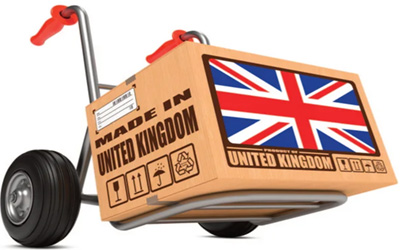Essentials Every Logistics Professional Must Know
Understanding Freight Insurance Fundamentals
The importance of freight insurance extends far beyond simple risk mitigation it’s a cornerstone of professional logistics operations that protects businesses from catastrophic financial losses. For freight forwarding companies operating in the UK’s competitive logistics landscape, comprehensive insurance coverage isn’t just recommended; it’s absolutely essential for maintaining operational stability and client confidence.
Freight insurance, also known as cargo insurance or goods in transit insurance, provides financial protection against loss, damage, or theft of goods during transportation. Unlike many business owners assume, standard carrier liability coverage offers severely limited protection that rarely covers the full value of shipped goods.
This gap in coverage can expose logistics companies and their clients to substantial financial risks that could potentially cripple business operations.
What Constitutes Comprehensive Freight Insurance Coverage
Comprehensive freight insurance coverage encompasses protection against a wide range of perils that can affect cargo during transit. These policies typically cover physical loss or damage resulting from collision, derailment, overturning, or stranding of the conveyance. Additionally, they provide protection against fire, explosion, theft, pilferage, and non-delivery of goods.
Modern freight insurance policies have evolved to address contemporary logistics challenges, including coverage for refrigeration breakdown, contamination, and even cyber-related incidents that might affect cargo tracking systems. The most robust policies offer “all-risk” coverage, which protects against all causes of loss except those specifically excluded in the policy terms.
Common Misconceptions About Carrier Liability
One of the most dangerous misconceptions in the freight forwarding industry concerns carrier liability limitations. Many business owners incorrectly assume that carriers provide comprehensive coverage for their goods. However, carrier liability is typically limited to a fraction of the cargo’s actual value often as little as £2 per pound for domestic shipments or approximately £500 per package for international air freight.
This limitation means that a shipment of electronics worth £50,000 might only be covered for a few hundred pounds under standard carrier liability. The stark reality is that carriers are legal bailees, not insurers, and their liability is strictly limited by international conventions and domestic regulations.
The Financial Impact of Uninsured Cargo Losses
The financial consequences of operating without adequate freight insurance can be devastating for logistics companies and their clients. Industry statistics reveal that cargo theft alone costs the global economy over £40 billion annually, while natural disasters, accidents, and other incidents contribute billions more in losses.
For freight forwarding companies like SARR Logistics Ltd operating in the UK market, uninsured losses can result in immediate out-of-pocket expenses, damaged client relationships, potential litigation, and long-term reputational damage. The ripple effects of a single uninsured incident can extend far beyond the immediate financial loss, affecting cash flow, insurance premiums, and business growth opportunities.
Real-World Case Studies from UK Freight Forwarding Operations
Consider the case of a Manchester-based freight forwarder that suffered a £2.3 million loss when a container of high-end automotive parts was stolen during transit through Eastern Europe. Without adequate insurance coverage, the company faced bankruptcy and ultimately had to sell their operations to a larger competitor.
Another instructive example involves a London logistics firm that lost an entire shipment of pharmaceutical products due to temperature excursion during air transport. The £800,000 loss, combined with regulatory fines and client lawsuits, forced the company into administration within six months.
 Calculating Potential Loss Exposure in International Trade
Calculating Potential Loss Exposure in International Trade
Professional risk assessment involves calculating maximum probable loss scenarios across all active shipments and routes. This calculation should consider the highest-value single shipment, aggregate exposure across multiple concurrent shipments, and potential consequential losses including lost profits, extra expenses, and legal costs.
Freight forwarders should conduct regular exposure analyses, considering factors such as cargo values, transportation modes, geographic risks, seasonal variations, and client-specific requirements. This comprehensive approach enables informed decision-making about appropriate insurance coverage levels and risk retention strategies.
Types of Freight Insurance Policies Available
The freight insurance market offers various policy types designed to meet diverse business needs and risk profiles. Understanding these options is crucial for selecting appropriate coverage that balances protection with cost-effectiveness.
Named perils policies provide coverage only for specifically listed risks, making them more affordable but potentially leaving gaps in protection. Open perils or “all-risk” policies offer broader coverage, protecting against all causes of loss except those specifically excluded. Annual policies provide ongoing coverage for regular shippers, while single-shipment policies cater to occasional or one-off movements.
Marine Cargo Insurance for Ocean Freight
Marine cargo insurance represents the oldest and most established form of freight insurance, evolved from centuries of maritime trade. These policies are governed by the Institute Cargo Clauses, which provide standardised terms and conditions recognised internationally.
Institute Cargo Clauses A provides the broadest coverage, protecting against all risks except war, strikes, and inherent vice. Clauses B and C offer more limited coverage for specific named perils. Marine insurance policies also address unique ocean freight risks including general average contributions, salvage charges, and sue and labor expenses.
Air Cargo Insurance for Time-Sensitive Shipments
Air cargo insurance addresses the specific risks associated with aviation transport, including rapid decompression, turbulence damage, and emergency landings. These policies often provide higher coverage limits and faster claims processing to match the expedited nature of air freight operations.
Modern air cargo policies incorporate coverage for delays caused by aircraft mechanical failures, weather diversions, and airport closures. Given the high-value nature of many air shipments, these policies frequently include enhanced security provisions and specialised handling requirements.
 Key Risk Factors in Modern Logistics Operations
Key Risk Factors in Modern Logistics Operations
Contemporary logistics operations face an increasingly complex array of risk factors that make freight insurance more critical than ever. Global supply chain disruptions, climate change impacts, and evolving security threats require sophisticated risk management approaches.
Geopolitical instability affects shipping routes and increases the likelihood of delays, diversions, and confiscations. Economic volatility can impact currency exchange rates and affect the cost of claims settlements. Technological dependence creates new vulnerabilities related to cyber attacks and system failures.
Environmental and Weather-Related Cargo Risks
Climate change has intensified weather-related risks affecting cargo shipments worldwide. Extreme weather events, including hurricanes, floods, and temperature fluctuations, pose significant threats to goods in transit. The increasing frequency and severity of these events make environmental risk assessment a critical component of freight insurance planning.
Temperature-sensitive goods face particular challenges, with climate-controlled transportation becoming increasingly complex and expensive. Insurance policies must address equipment failures, power outages, and extended transit times that can compromise cargo integrity.
Security Threats and Theft Prevention Strategies
Cargo theft has evolved from opportunistic crimes to sophisticated operations targeting high-value shipments. Modern thieves use advanced surveillance techniques, insider information, and technology to identify and steal valuable cargo. The rise of organised cargo theft rings has made security a paramount concern for freight forwarders.
Effective theft prevention strategies include secure routing, driver vetting, vehicle tracking systems, and secure parking facilities. Insurance policies increasingly require adherence to specific security protocols and may offer premium discounts for implementing enhanced security measures.
Legal Requirements and Regulatory Compliance
The regulatory landscape surrounding freight insurance continues to evolve, with increasing emphasis on consumer protection and industry standardisation. Freight forwarders must navigate complex legal requirements while ensuring adequate protection for their operations and clients.
Professional indemnity requirements, financial responsibility regulations, and industry-specific insurance mandates create a complex compliance environment. Failure to maintain appropriate insurance coverage can result in regulatory sanctions, loss of operating licenses, and significant legal liability.
UK Freight Forwarding Insurance Regulations
The UK freight forwarding industry operates under specific regulatory frameworks that mandate minimum insurance coverage levels. The British International Freight Association (BIFA) provides guidance on insurance requirements and industry best practices.
UK regulations require freight forwarders to maintain professional indemnity insurance, goods in transit coverage, and general liability protection. Post-Brexit trade arrangements have introduced additional complexity, requiring enhanced documentation and potentially different insurance requirements for EU and non-EU trade.
International Insurance Standards and Conventions
International freight operations are governed by various conventions and treaties that establish liability limitations and insurance requirements. The Warsaw Convention for air transport, the Hague-Visby Rules for maritime shipments, and the CMR Convention for road transport each establish different liability frameworks.
Understanding these international standards is crucial for freight forwarders operating across multiple jurisdictions. Insurance policies must be structured to comply with various international requirements while providing comprehensive protection.
Choosing the Right Insurance Provider and Policy
Selecting an appropriate insurance provider requires careful evaluation of multiple factors beyond premium costs. The provider’s financial stability, claims-paying ability, international presence, and industry expertise all contribute to the overall value proposition.
A.M. Best ratings, Standard & Poor’s assessments, and Lloyd’s of London syndicate ratings provide insights into insurers’ financial strength. Industry specialisation and experience with freight forwarding operations ensure better understanding of unique risks and requirements ask SARR Logistics for information during the quoting period.
Evaluating Insurance Companies’ Claims Processing
Claims processing efficiency directly impacts business operations and cash flow during critical periods. The best insurance providers offer 24/7 claims reporting, experienced adjusters with freight industry knowledge, and streamlined documentation requirements.
Response times, settlement ratios, and customer satisfaction scores provide valuable insights into insurers’ claims performance. Freight forwarders should seek providers with proven track records of fair and expeditious claims handling.
 Understanding Policy Terms and Exclusions
Understanding Policy Terms and Exclusions
Insurance policy language can be complex and technical, making professional interpretation essential. Key areas requiring careful review include coverage territories, excluded perils, deductible structures, and claims notification requirements.
Common exclusions include war risks, nuclear hazards, inherent vice, and inadequate packaging. Understanding these limitations enables appropriate risk management and supplemental coverage where necessary.
Claims Management & Documentation Best Practices
Effective claims management begins with proper documentation and risk assessment before incidents occur. Comprehensive record-keeping, prompt notification procedures, and systematic evidence preservation are crucial for successful claims resolution.
Digital documentation systems, photographic evidence, and witness statements strengthen claims presentations. Immediate notification to insurers, preservation of damaged goods, and cooperation with adjusters facilitate efficient processing.
Essential Documentation for Successful Claims
Successful claims require comprehensive documentation including commercial invoices, bills of lading, packing lists, and survey reports. Temperature logs, GPS tracking data, and security footage increasingly play important roles in claims investigations.
Pre-shipment condition surveys, loading photographs, and delivery receipts provide crucial evidence of cargo condition throughout the transportation process. Digital documentation systems facilitate rapid claims processing and reduce administrative burdens.
 Working with Insurance Adjusters and Surveyors
Working with Insurance Adjusters and Surveyors
Professional adjusters and surveyors play crucial roles in claims investigations and settlements. Establishing positive working relationships with these professionals can expedite claims processing and ensure fair settlements.
Cooperation, transparency, and prompt response to adjuster requests facilitate efficient claims resolution. Understanding adjusters’ requirements and expectations helps freight forwarders present claims effectively and professionally.
Cost-Benefit Analysis of Freight Insurance Investment
Freight insurance premiums represent a small percentage of cargo values but provide protection against potentially catastrophic losses. Professional cost-benefit analysis should consider premium costs, deductible levels, coverage limits, and potential loss scenarios.
Risk retention strategies, self-insurance options, and captive insurance arrangements may be appropriate for larger freight forwarding operations. These alternatives require careful analysis of loss history, cash flow implications, and regulatory requirements.
Premium Calculations and Risk Assessment Factors
Insurance premiums are calculated based on numerous risk factors including cargo types, transportation modes, geographic routes, loss history, and security measures. Understanding these factors enables freight forwarders to optimise their risk profiles and potentially reduce premium costs.
Route selection, packaging improvements, security enhancements, and loss prevention programs can positively impact premium calculations. Regular risk assessments and loss control measures demonstrate commitment to risk management and may qualify for premium discounts.
Long-term Financial Benefits of Comprehensive Coverage
Comprehensive freight insurance provides long-term financial benefits beyond immediate loss protection.
Stable insurance coverage enhances business credibility, facilitates client relationships, and supports business growth opportunities.
Access to larger contracts, improved bank financing terms, and enhanced competitive positioning are additional benefits of maintaining comprehensive insurance coverage. The investment in proper insurance protection often generates returns through improved business opportunities and reduced financial volatility. SARR Logistics UK offer a full range of insurance policies we will always advise the “all Risk” as it covers your cargo for the full value not a persentage just ask our staff when gaining a bespoke-quote.
Industry-Specific Insurance Considerations
Different industries present unique risks and insurance requirements that must be addressed through specialised coverage approaches. High-tech electronics, pharmaceuticals, automotive parts, and fashion goods each present distinct risk profiles requiring tailored insurance solutions.
Industry-specific exclusions, specialised handling requirements, and unique valuation methods must be considered when structuring appropriate insurance programs. Understanding these nuances ensures adequate protection for specialized cargo types.
High-Value Electronics and Technology Shipments
Electronics and technology shipments face risks including electromagnetic interference, static discharge, temperature sensitivity, and high theft potential. Insurance policies for these goods often require specialised packaging, security protocols, and handling procedures.
Coverage for technological obsolescence, software licensing issues, and recall costs may be necessary for electronics shipments. The rapid depreciation of technology products requires careful consideration of valuation methods and coverage limits.
 Perishable Goods and Temperature-Controlled Logistics
Perishable Goods and Temperature-Controlled Logistics
Perishable goods transportation requires specialized insurance coverage addressing temperature excursions, equipment failures, and extended transit times. Cold chain integrity monitoring and documentation are crucial for successful claims processing.
Coverage for spoilage, contamination, and regulatory rejection must be considered for perishable shipments. The time-sensitive nature of these goods requires expedited claims processing and specialised adjuster expertise.
Technology Integration in Modern Freight Insurance
Technology integration is revolutionising freight insurance through improved risk assessment, real-time monitoring, and automated claims processing. Internet of Things (IoT) sensors, blockchain documentation, and artificial intelligence are enhancing insurance capabilities.
Digital platforms enable real-time cargo tracking, condition monitoring, and automated alert systems. These technologies provide insurers with unprecedented visibility into cargo conditions and transportation risks.
Digital Documentation and Blockchain Applications
Blockchain technology offers secure, immutable documentation that can streamline claims processing and reduce fraud. Smart contracts can automate certain aspects of insurance coverage and claims settlement.
Digital bills of lading, electronic certificates, and cloud-based documentation systems improve efficiency and reduce administrative costs. These technologies also enhance transparency and facilitate regulatory compliance.
IoT Monitoring and Real-Time Risk Assessment
IoT sensors provide real-time monitoring of temperature, humidity, shock, and location data throughout the transportation process. This information enables proactive risk management and can prevent losses before they occur.
Real-time alerts enable immediate response to adverse conditions, potentially minimising losses and insurance claims. Historical sensor data also provides valuable insights for risk assessment and premium calculations.
Future Trends in Freight Insurance and Risk Management
The freight insurance industry continues to evolve in response to changing risks, technological advances, and regulatory developments. Artificial intelligence, predictive analytics, and automated underwriting are reshaping traditional insurance approaches.
Climate change impacts, cyber security threats, and supply chain complexity will drive continued innovation in risk assessment and coverage design. Parametric insurance products, usage-based premiums, and dynamic pricing models represent emerging trends in freight insurance.
Sustainability considerations, carbon footprint tracking, and environmental compliance will increasingly influence insurance requirements and premium calculations. The integration of environmental, social, and governance (ESG) factors into risk assessment reflects broader industry trends toward sustainable business practices.
Conclusion
The importance of freight insurance in today’s complex logistics environment cannot be overstated.
For UK freight forwarding companies Like SARR Logistics Ltd and international logistics providers, comprehensive insurance coverage represents a fundamental business necessity that protects against financial catastrophe while enabling growth and competitive advantage.
Professional freight forwarders who invest in appropriate insurance coverage demonstrate commitment to risk management, client protection, and operational excellence. The relatively modest cost of comprehensive freight insurance pales in comparison to the potential financial devastation of uninsured cargo losses.
As the logistics industry continues to evolve, with increasing complexity, higher cargo values, and emerging risks, the role of freight insurance becomes ever more critical. Forward-thinking logistics professionals recognise that freight insurance isn’t just about protecting against losse it’s about enabling business growth, maintaining client confidence, and securing long-term operational sustainability.
The decision to invest in comprehensive freight insurance coverage represents a strategic business choice that impacts every aspect of logistics operations. From regulatory compliance and client relationships to financial stability and competitive positioning, proper insurance coverage provides the foundation for professional freight forwarding success in an increasingly challenging global marketplace.
FAQ
What is the difference between freight insurance and carrier liability?
Freight insurance provides comprehensive coverage for the full value of shipped goods against various risks, while carrier liability offers limited protection typically capped at a few pounds per kilogram or package. Carrier liability rarely covers the actual value of goods, making separate freight insurance essential for adequate protection.
How much does freight insurance typically cost?
Freight insurance premiums generally range from 0.1% to 2% of the cargo value, depending on factors such as cargo type, transportation mode, route risks, and coverage level. High-value or high-risk shipments may require higher premiums, while routine shipments on secure routes typically qualify for lower rates.
Can I purchase freight insurance for a single shipment?
Yes, single-shipment or one-off freight insurance policies are available for occasional shippers or unique cargo movements. These policies provide the same comprehensive coverage as annual policies but are purchased on a per-shipment basis, making them ideal for businesses with irregular shipping patterns.
What documentation is required for freight insurance claims?
Essential documentation includes commercial invoices, bills of lading, packing lists, delivery receipts, damage photographs, and incident reports. Additional documentation may include temperature logs, survey reports, police reports, and correspondence with carriers or other parties involved in the shipment.
Are there any goods that cannot be insured under freight insurance policies?
Most freight insurance policies exclude certain high-risk items such as money, precious metals, artworks, livestock, and hazardous materials. Some exclusions may be overcome through specialised coverage or additional premiums, while others may require entirely different insurance products.
How quickly are freight insurance claims typically settled?
Claims settlement timeframes vary depending on the complexity of the loss, quality of documentation, and cooperation of all parties. Simple claims with clear documentation may be settled within 30-60 days, while complex claims involving investigations or disputes may take several months to resolve.


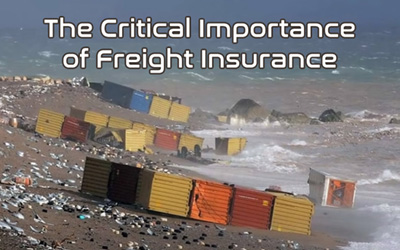
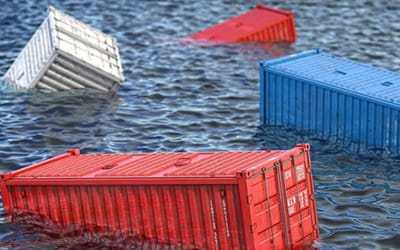
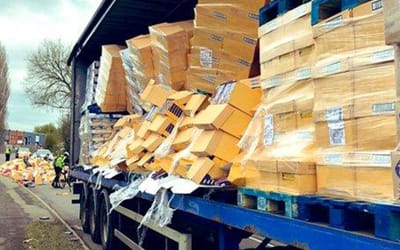 Calculating Potential Loss Exposure in International Trade
Calculating Potential Loss Exposure in International Trade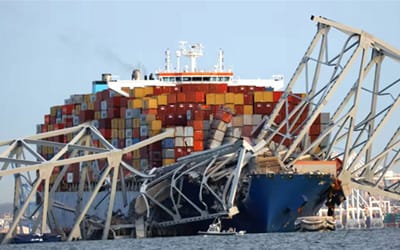 Key Risk Factors in Modern Logistics Operations
Key Risk Factors in Modern Logistics Operations
 Understanding Policy Terms and Exclusions
Understanding Policy Terms and Exclusions Working with Insurance Adjusters and Surveyors
Working with Insurance Adjusters and Surveyors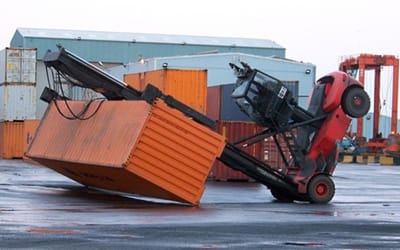
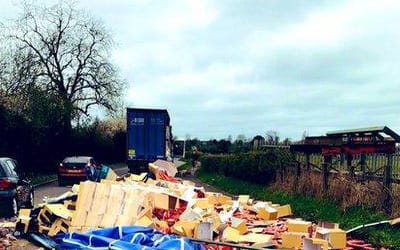 Perishable Goods and Temperature-Controlled Logistics
Perishable Goods and Temperature-Controlled Logistics






